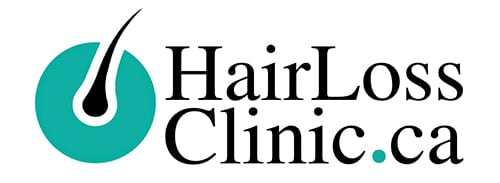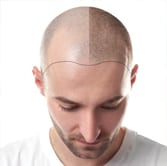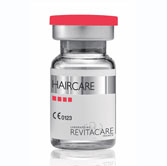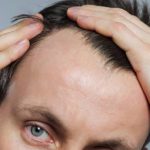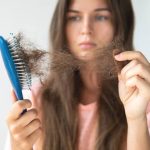
HAIR LOSS IN WOMEN 101 – PREVENTION AND TREATMENT
Hair loss is a common condition that can affect anyone, but it is especially prevalent in women. Various factors, including genetics, hormonal changes, medical conditions, and lifestyle factors, can cause hair loss in women. This article will explore the main reasons for hair loss in females, the different types of hair loss, and the various treatment options available.
Trichologists play a vital role in hair loss, as they are specialized professionals who diagnose and treat hair and scalp conditions. Trichologists utilize their expertise and knowledge to assist individuals in comprehending the underlying causes of their hair loss and devising tailored treatment plans. They are trained to assess the scalp’s health, analyze hair follicles, and identify any underlying conditions that may contribute to hair loss.
Trichologists utilize various tools and techniques to evaluate hair loss, including conducting hair and scalp examinations, analyzing medical history, and performing laboratory tests if necessary. By thoroughly examining these factors, trichologists can determine the most appropriate course of action and recommend suitable treatments.
Their expertise extends beyond diagnosing and treating hair loss. Trichologists also guide preventive measures and lifestyle changes that can support hair health. They may advise on proper nutrition, stress management techniques, and hair care practices to promote healthy hair growth and prevent future hair loss.
Book Your Free Consultation Today Or Call (647) 492-9093

FREE ONLINE HAIR LOSS ASSESSMENT FORM
Hair loss in women is a treatable condition in most cases. Are you experiencing womens hair loss? Get a Certified Trichologist to assess and help treat your condition in Toronto and Greater Toronto Area. Please complete our online Trichology Assessment Form to get started now.
WHAT IS THE MAIN REASON FOR HAIR LOSS IN FEMALES?
Female pattern hair loss, commonly known as androgenetic alopecia, is the major cause of hair loss in women—genetic, hormonal, and environmental factors cause this condition. Androgenetic alopecia affects millions of women worldwide and can cause significant distress and embarrassment. Other possible reasons for hair loss in females include nutritional deficiencies, hormonal imbalances, autoimmune conditions, and cancer treatments.
WHAT IS FEMALE PATTERN HAIR LOSS?
Female pattern hair loss is a form of androgenetic alopecia that primarily affects women. This condition is characterized by hair thinning on the top and crown of the head, which may lead to baldness in more advanced cases. Female pattern hair loss is caused by genetic and hormonal factors, with the androgen hormone dihydrotestosterone (DHT) playing a crucial role. Female pattern hair loss typically progresses slowly over many years, and early treatment can help slow or even reverse the process.
WHAT IS TELOGEN EFFLUVIUM?
Telogen effluvium is a condition that occurs when multiple hair follicles enter the resting phase of the hair growth cycle. Various factors, including hormonal changes, stress, nutritional deficiencies, and certain medications, can cause this. Telogen effluvium is typically characterized by diffuse hair thinning and shedding, usually temporary. In most cases, hair will grow back once the condition’s underlying cause is resolved.
WHAT IS CHRONIC TELOGEN EFFLUVIUM?
A chronic telogen effluvium is a long-term form of telogen effluvium that can last for many months or even years. It is typically characterized by diffuse hair thinning and shedding, and various factors, including hormonal imbalances, nutritional deficiencies, and stress, can cause it. Chronic telogen effluvium can be challenging to treat, and a thorough evaluation by a healthcare provider is necessary to identify and address the underlying cause.
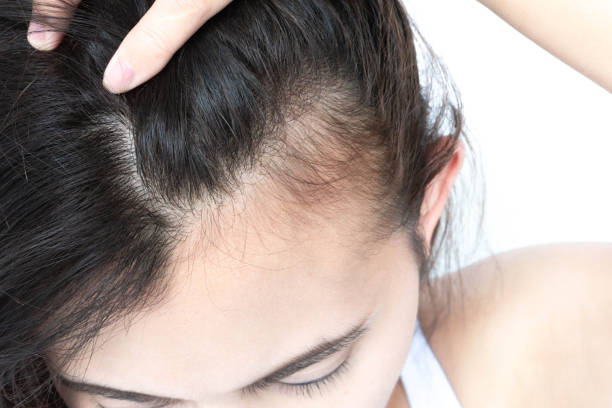

CAN IRON DEFICIENCY CAUSE HAIR LOSS?
Iron is an essential nutrient for healthy hair growth, and an iron deficiency can cause hair to become weak and brittle, leading to hair loss. Iron deficiency is a common nutritional deficiency worldwide, especially in women of childbearing age. Therefore, if you are experiencing hair loss, speaking with a healthcare provider to determine if an iron deficiency is an underlying cause is essential.
WHAT LACK OF VITAMINS CAUSES HAIR LOSS?
Some studies have linked hair loss to a deficiency in vitamin D. Vitamin D is essential for adequately functioning hair follicles; a lack can lead to hair thinning and loss. Biotin, zinc, and vitamin B12 are among the vital nutrients necessary for promoting healthy hair growth. If you are experiencing hair loss, you must speak with a healthcare provider to determine if a vitamin deficiency is an underlying cause.
CAN FEMALE HAIR LOSS GROW BACK?
Whether or not female hair loss can grow back depends on the condition’s underlying cause. For example, in cases of androgenetic alopecia, hair loss can be slowed or even reversed with medications such as minoxidil and spironolactone. On the other hand, in cases of telogen effluvium, hair typically grows back on its own once the underlying cause is resolved. In addition, regrowth may be possible with certain medications or treatments for other forms of hair loss, such as alopecia areata or cicatricial alopecia.
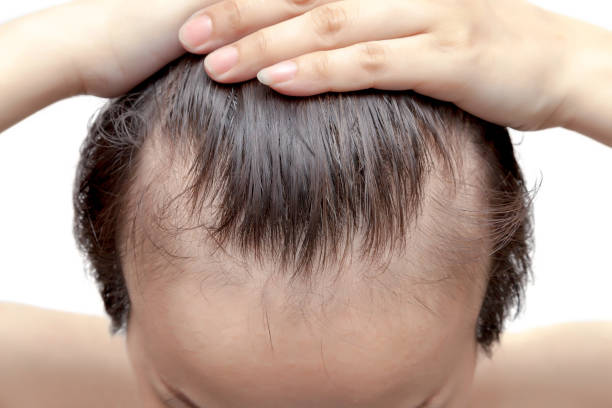
Hair Loss Treatments
Scalp Micropigmentation
One promising treatment option for hair loss in women is scalp micropigmentation. It is a method that involves placing small dots of pigment on the scalp to simulate the appearance of hair follicles. This can be an effective solution for women with thinning hair or bald spots who do not want to undergo invasive surgical procedures.
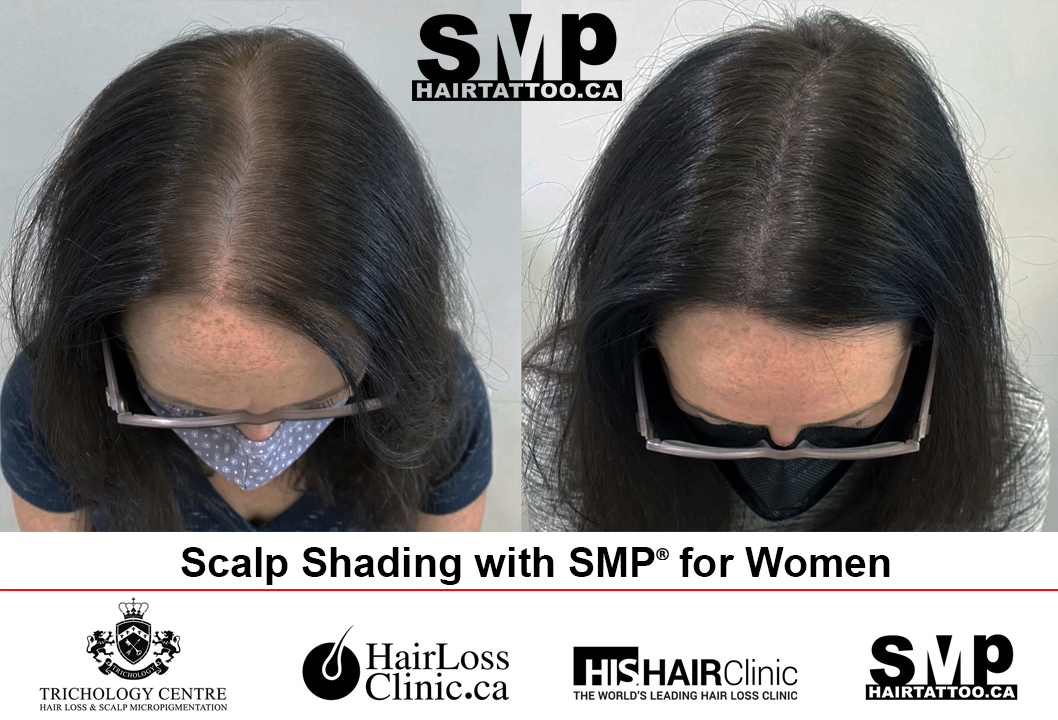
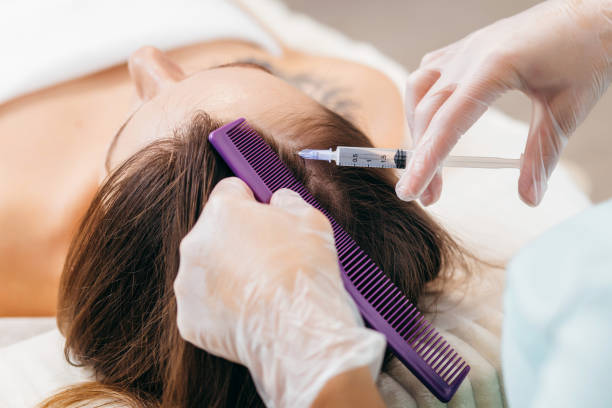
PRP
Another option is platelet-rich plasma (PRP) hair treatment, which injects a concentrated solution of the patient’s blood platelets into the scalp to promote hair growth. This treatment has shown promising results in clinical trials, but more research is needed to determine its long-term effectiveness.
Theradome Laser Helmet
Another option is platelet-rich plasma (PRP) hair treatment, which injects a concentrated solution of the patient’s blood platelets into the scalp to promote hair growth. This treatment has shown promising results in clinical trials, but more research is needed to determine its long-term effectiveness.

Takeaway
It is important to note that early diagnosis and treatment of hair loss can improve the chances of successful treatment and regrowth. It is crucial to seek advice from a healthcare provider or dermatologist to identify the root cause of hair loss and consider treatment options.
In addition to medical treatments, maintaining a healthy lifestyle can also aid in preventing and treating hair loss. This includes eating a balanced diet of essential vitamins and minerals, regularly exercising, managing stress levels, and avoiding harsh hair treatments and styles.
Hair loss in women can be a distressing condition, but various treatment options are available to help manage and even reverse the effects. Therefore, addressing hair loss early on is essential as working with a healthcare provider to determine the underlying cause and explore appropriate treatment options. Additionally, maintaining a healthy lifestyle can aid in prevention and treatment.
Q & A
What is the most common cause of hair loss in females?
Androgenetic alopecia is the most prevalent cause of hair loss in women. It is a genetic condition that affects the hair follicles and leads to gradual hair thinning and shedding, primarily in the crown and frontal areas of the scalp. Women with androgenetic alopecia may notice a widening part or a smaller ponytail, and in severe cases, baldness. This condition is also known as female pattern hair loss.
What is the typical duration for hair to regrow after experiencing hair loss?
The amount of time it takes for hair to grow back after hair loss depends on the underlying cause of the condition. In cases of androgenetic alopecia, new hair growth may be seen within a few months of treatment. However, for other conditions such as alopecia areata, it may take longer for hair to regrow, and in some cases, the hair loss may be permanent.
Can female hair loss be reversed?
Whether or not female hair loss can be reversed depends on the underlying cause of the condition. In cases of androgenetic alopecia, hair loss can be slowed or even reversed with the use of medications such as minoxidil and spironolactone. However, if the hair loss is due to a medical condition or medication, treating or discontinuing the cause may help slow or stop the hair loss.
How can I stimulate hair growth on my scalp?
There are several ways to stimulate hair growth on the scalp, including using medications such as minoxidil and spironolactone, undergoing platelet-rich plasma therapy or low-level laser therapy, or using hair growth supplements. It’s important to consult with a trichologist before starting any new treatments.
Can iron deficiency cause hair loss in females?
Yes, iron deficiency is a common cause of hair loss in females. This is because iron is essential for the growth and maintenance of hair follicles. If you think that your hair loss is due to iron deficiency, a blood test can confirm the diagnosis, and your healthcare provider may recommend iron supplements or dietary changes.
How can I prevent female hair loss?
There are several ways to prevent female hair loss, including maintaining a healthy diet rich in essential vitamins and minerals, reducing stress, avoiding harsh hair treatments and styles, and getting regular exercise. Additionally, it’s important to manage any underlying medical conditions and to avoid medications that are known to cause hair loss.
Can stress cause hair loss in women?
Yes, stress can cause hair loss in women. Indeed, hair loss in women can be caused by stress. Telogen effluvium is a prevalent type of hair loss that occurs due to stress, illness, surgery, or other factors that can interrupt the normal hair growth cycle. However, hair loss due to stress is temporary and can be reversed with time and stress management techniques.
How can I thicken my hair?
There are several ways to thicken hair, including using volumizing shampoos and conditioners, avoiding harsh hair treatments and styles, taking hair growth supplements, and eating healthy meals rich in vitamins and minerals. Additionally, some people may benefit from using hair fibers or scalp micropigmentation to create the illusion of thicker hair. Scalp micropigmentation can also give the illusion of thicker hair by using a tattoo procedure to place tiny dots of pigment into the scalp to replicate the look of hair follicles.
Are there any natural remedies for female hair loss?
While there is limited scientific evidence to support the effectiveness of natural remedies for female hair loss, some people believe that certain natural ingredients such as pumpkin seed oil, saw palmetto, and essential oils like lavender and rosemary can promote hair growth. Using natural remedies for hair loss should be approached with caution, and it’s advisable to seek guidance from a healthcare provider as they may interact with medications or cause adverse reactions.
Is hair transplant surgery a good option for women with hair loss?
A hair transplant can be an effective treatment option for women with hair loss. However, it’s important to consult a qualified and experienced hair transplant surgeon to determine if it is the right choice for your case. In addition, factors such as the extent of hair loss, the availability of the donor’s hair, and the patient’s overall health and expectations should be considered before the procedure.
Can wearing hats or tight hairstyles cause hair loss in women?
Wearing tight hairstyles or hats can cause hair loss called traction alopecia. This occurs when the hair is pulled tightly for prolonged periods, causing damage to the hair follicles. To prevent traction alopecia, it’s important to avoid tight hairstyles and hats that pull on the hair and to give the hair frequent breaks from styling and manipulation.
Are there any medications that can cause hair loss in women?
Yes, certain medications can cause hair loss in women. Chemotherapy drugs, for example, can cause hair loss as a side effect, but this type of hair loss is usually temporary and reversible once treatment is completed. Other medications, such as blood thinners, antidepressants, and oral contraceptives, can cause hair loss in some women. If medication is causing your hair loss, it is important to consult with your healthcare provider to discuss alternative treatments that do not have hair loss as a side effect.
Can hair loss in women be a sign of an underlying health condition?
Yes, hair loss in women can indicate an underlying health condition such as an underactive thyroid, polycystic ovary syndrome (PCOS), or a nutritional deficiency. You can address hair loss more effectively by seeking the expertise of a trichologist, who can help identify the cause and develop an appropriate hair loss treatment plan.
Comments are closed.
